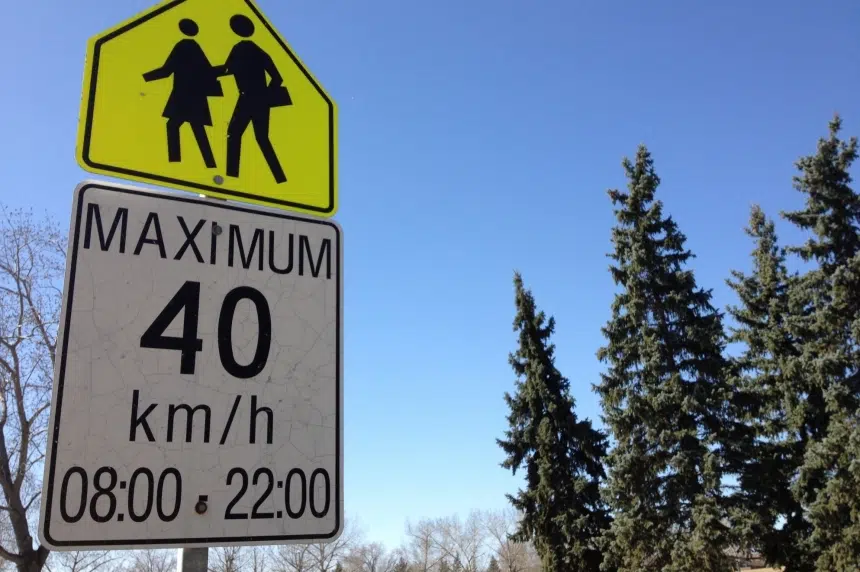Speed limits, children and dogs were the hot-button topics at Monday night’s Regina city council meeting.
Come fall, drivers will be cruising at 30 kilometres per hour between 7 a.m. and 7 p.m., year-round in playground and school zones. Until then, the speed limit remains 40 km/h between 8 a.m. and 10 p.m. in those areas.
City council passed those changes Monday night, with the Regina School Pedestrian and Traffic Safety Committee citing how the 10 km/h difference will increase survivability rates in pedestrian-versus-vehicle collisions.
“It’s a 97-per-cent survival rate from 30 km/h to 40 km/h,” noted Christine Niemczyk with CAA Saskatchewan.
Niemczyk is a part of the school zone consultation committee, along with members of the Regina Police Service and the city’s public and separate school boards. She smiled when the changes were passed because it was three years in the making.
“We’re very, very pleased,” she said. “We don’t need to wait for an accident to happen; let’s be prevention-oriented and do something now.”
Ward 10 Coun. Jerry Flegel was the only one opposed to the motion, suggesting council amend it to keep the 40 km/h but switch the time to 8 a.m. to 8 p.m., year-round.
“All (30 km/h) is going to do is increase speeding,” he argued. “Everybody’s going to be driving 40 km/h now and they’re going to get a ticket; that’s what’s going to happen.”
Niemczyk noted speeding will always be a factor, regardless of the limit.
“At 40 (km/h), they were probably going 50 anyways, so at 30, they’ll still probably go a little faster,” she said, adding increased survivability rates trump speeding tickets.
The reduced school zone speed limit kicks in Sept. 1.
Temporary off-leash dog areas added in north Regina
Councillors approved two new seasonal off-leash dog sites in the city’s northwest end: The outdoor rinks near the Joanne Goulet Golf Course and the North West Leisure Centre.
However, the decision didn’t come without debate; members from Regina’s dog community shared their concerns with council regarding the need for more permanent off-leash dog parks around the city.
“It’s time to stop thinking in terms of the temporary and interim, and to set out some specific targets for off-leash park space,” Lynda Schofield told council. “Other cities can do this, why can’t Regina?”
Similar frustration was felt by Ward 8 Coun. Mike O’Donnell, who, in 2014, brought up building permanent off-leash dog parks during the development of the city’s newer neighbourhoods.
In 2016, city administration was tasked with creating a report to figure out where to add these new dog parks. The promise was to have one each in the south, east and northwest ends of town.
“It’s been on my mind as well,” said O’Donnell. “I think someone maybe just decided it wasn’t that important, so it kind of got shelved.”
Ward 7 Coun. Sharron Bryce echoed the frustration, telling council her dog has died since the first discussions were had about additional permanent parks.
“How many more dogs need to pass away before these parks open?” Bryce asked. “Are we going to get these dog parks before people’s (current) dogs pass away, or wait for a whole new generation?”
Ward 4 Coun. Lori Bresciani agreed, noting she has had several calls from residents who are asking for more off-leash dog parks in the city.
At the end of the debate, city administration was told to make up a report to present by the end of this year. It’s expected to contain a plan with consultation from developers on where to implement these permanent off-leash dog parks.
Connie Buchan, the administrator for the Off-Leash Dog Park User Group on Facebook, spoke on behalf of some of Regina’s dog owners community at council Monday night. She said owners feel strongly that the city needs to consult more with them, not land developers.
“They should be consulting people who use dog parks at this stage and find out what we want, not coming to us when it’s already designed,” Buchan said.
Mayor Michael Fougere acknowledged consultation with dog owners is crucial in making these decisions, but notes because the city only owns about five per cent of the land in Regina, it’s important to keep communication lines open on all ends.
“In fairness, if we do this in a strategic way, with land owners and developers, we’ll find some comfort because we’ll get it done quickly,” Fougere explained.











